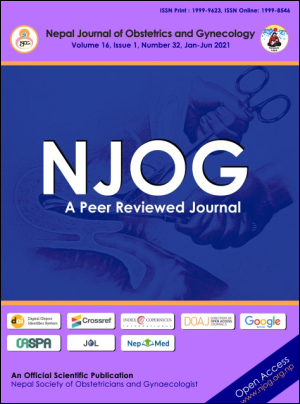Clinical outcome of sacrospinous fixation following pelvic organ prolapse surgery
Keywords:
fixation, follow up, pelvic organ prolapse, sacrospinousAbstract
Aims: To evaluate the midterm outcome of sacrospinous fixation done during surgical management of pelvic organ prolapse.
Methods: This was an interview based cross sectional follow up study done among the patients who underwent sacrospinous fixation procedure along with pelvic organ prolapse surgery in Kathmandu Model Hospital and Paropakar Maternity Hospital. This was conducted between 15 th February 2021 and 15 th April 2021. Post-operative cases 22 to 30 months (average 2 years) from the day of surgery were included.
Results: Out of 321 eligible SSF patients from both the hospital, 156 agreed to participate. Among them, 77 (48%) were in 60-69 years of age and 82% were postmenopausal; 33% were more than para 3; 20% had right gluteal pain that was decreased to 1.9% by 2 years; and 20% had some degree of urgency and stress incontinence.
Conclusion: Sacrospinous fixation is safe and effective procedure which can be done during pelvic organ prolapse surgery with good success rate and minimal post-operative complications.
Downloads
Downloads
Published
How to Cite
Issue
Section
License
Copyright (c) 2021 Sandesh Poudel, Ganesh Dangal

This work is licensed under a Creative Commons Attribution-NonCommercial 4.0 International License.
Copyright on any research article in the Nepal Journal of Obstetrics and Gynaecology is retained by the author(s).
The authors grant the Nepal Journal of Obstetrics and Gynaecology a license to publish the article and identify itself as the original publisher.
Articles in the Nepal Journal of Obstetrics and Gynaecology are Open Access articles published under the Creative Commons CC BY-NC License (https://creativecommons.org/licenses/by-nc/4.0/)
This license permits use, distribution and reproduction in any medium, provided the original work is properly cited, and it is not used for commercial purposes.



